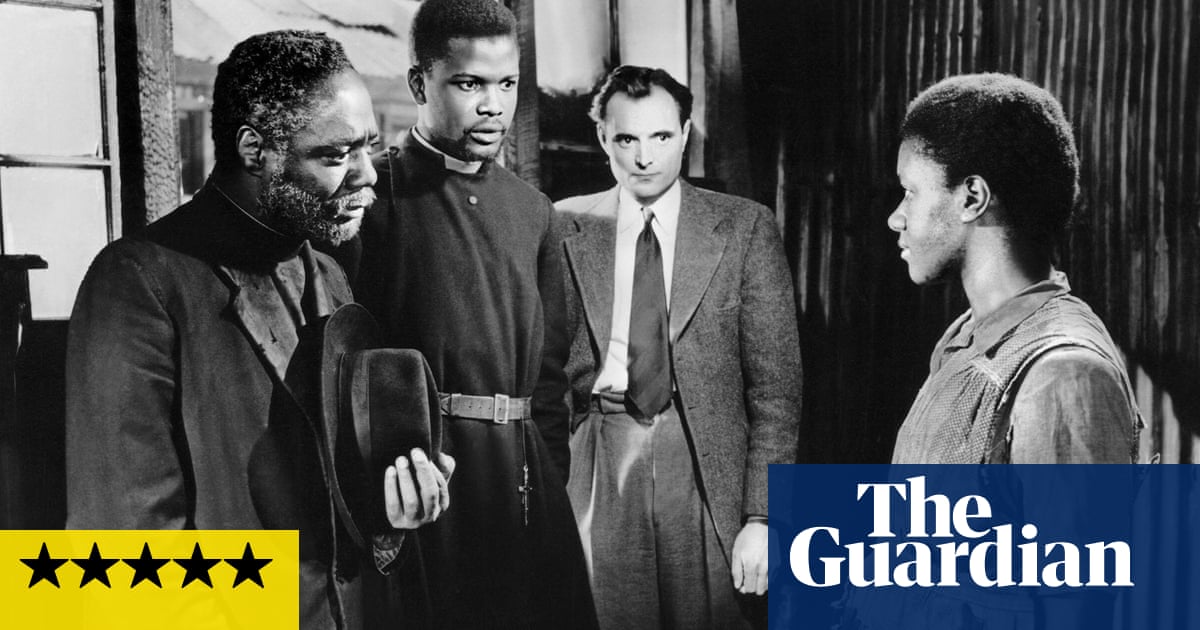
Zoltan Korda’s thrilling movie version of Alan Paton’s novel was first released in 1951, when South Africa’s racist apartheid policy was only three years of age and maybe enough of a novelty to be thought of as something amenable to second thoughts, capable of being reformed or even abolished. Paton’s novel itself was published in 1948, the same year as apartheid appeared. Now this film is rereleased, revealing again that it has a crusading preacher’s urgency and moral seriousness, appropriate for a story of priests.
After a slow start, the movie hits a muscular, compelling stride; it is a drama with an obvious biblical parallel, but also a quite genuine Shakespearean resonance in the tragic dimension of its final act and the Montague/Capulet reconciliation it envisions for black and white, bought with the self-sacrificial forgiveness for a capital crime. Perhaps modern audiences would be restive at a story about apartheid South Africa that appears to centre its eventual moral judgment amid the white community and white victimhood, but its passion and idealism blaze out.
It is a drama of the country and the city. In the fictional village of Ndotsheni, whose lush upper slopes are farmed by the white man and the stonier lower ground by the “natives”, an old black minister, Stephen Kumalo, is deeply troubled by the absence of his son, named Absalom, perhaps after King David’s son in the Bible. Absalom has some years before left for the fleshpots of Johannesburg, allegedly to find his aunt, Stephen’s sister, who has reportedly gone to the bad there. But Absalom, like many others, has also sought the higher wages and greater freedoms offered in the city. He may well have simply gone to the bad himself.
Kumalo is played by the veteran US stage and screen actor and civil rights campaigner Canada Lee, who in making this British film was a refugee from America’s McCarthy-ism (like its uncredited co-writer John Howard Lawson). Lee’s performance is the very embodiment of sorrow in old age borne with stoicism, and his anguished gaze seems to wander almost sightlessly all over the screen.
Meanwhile, in parallel, a white farmer called Jarvis (played with thoughtful restraint by Charles Carson) works the land as best he can; he is a Forsterian “sun-dried bureaucrat” complaining like his white neighbours about the shortcomings of his black workforce, and baffled and irritated by the liberal enthusiasms of his son, who lives in Johannesburg and works for better housing for the black population. Jarvis may be a political hawk, but his wife is a gentle dove: this is Margaret, played by Joyce Carey (perhaps best known as the railway teashop manager in David Lean’s Brief Encounter; her more refined voice here puts the stage cockney into perspective).
Stephen journeys to Johannesburg, as innocent as a child for all his grey hairs, on a mission to find his son; he is helped there by a brotherhood of missionary clergymen, including Msimangu (an excellent, forthright performance from Sidney Poitier). And here he is to come across his worldly scapegrace brother John (Edric Connor), a carpenter who cares nothing for Stephen’s scruples, and also his son’s pregnant girlfriend. He will discover the awful truth about Absalom (Lionel Ngakane) and his drift into crime and his fateful connection with Jarvis’s well-meaning, campaigning son – whose journals old Jarvis is finally to read, and from which he gains some understanding about South Africa for the first time in his life.
Cry, the Beloved Country is very greatly about the importance of the Christian church as a unifying moral force: an authority in which black and white can find unity (in this way so very similar to the US civil rights movement). It is unashamedly and unfashionably a religious film, with a vehement speech from the white Father Vincent (Geoffrey Keen), delivered to Stephen in the depths of his agony and angry doubt. It also has a belief in decency (two different characters make apologies, at two different stages, about the rude and boorish way that they have just behaved); quaint, perhaps, but also possessing dignity and idealism. It is an utterly absorbing film.












